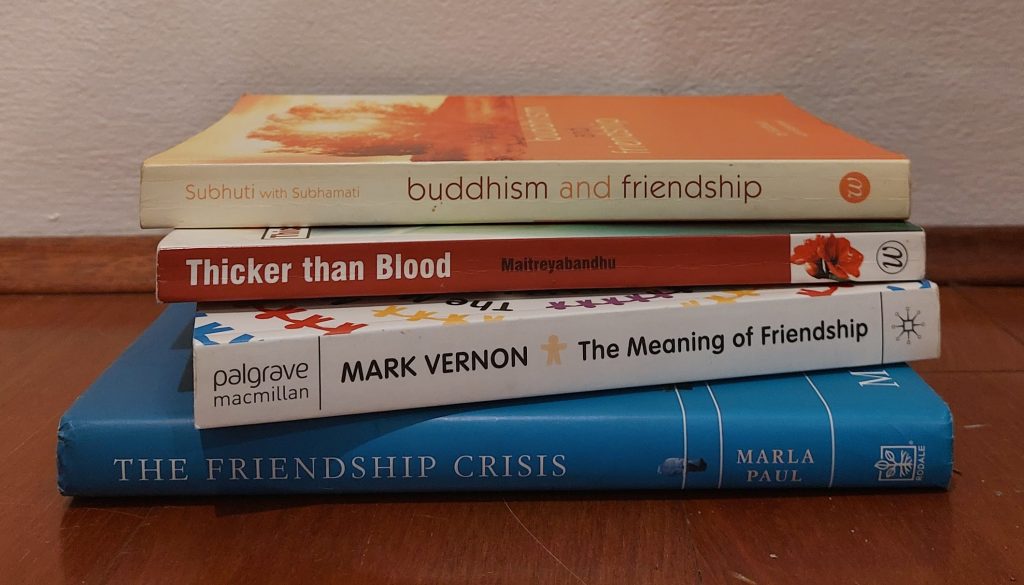Friends with the Benefit of Friendship –
A few years ago, I was enjoying lunch with a male friend at a cozy café in the lush Dandenong Ranges. After we finished our meal, the waitress, making assumptions, referred to my friend as my ‘husband’. I politely corrected her and explained that we were just friends. She winked and responded with, “friends with benefits?” I was stunned at her implication of romance. Without missing a beat, my friend Steve replied, “Friends with the benefit of friendship!” I could have kissed him — on the hand, of course.
As a qualified couple and family therapist, I’ve spent years studying romantic relationships, but the value of platonic relationships — genuine friendships — often doesn’t get the attention it deserves. Yet, friendship is the cornerstone of all good relationships, whether they are romantic, platonic, or sexual.
You might be surprised to learn that the phrase, ‘blood is thicker than water’, originally referred to friendship rather than family. The term was first used to describe the bond forged in the bloody battle between comrades — their bond being stronger than the connection of the water of birth.
Three Types of Friendship
The ancient Greek philosopher Aristotle identified three types of friendships:
- Friendships of Utility – These are friendships based on mutual benefit, such as relationships with colleagues or business partners.
- Friendships of Pleasure – These are the friends you enjoy spending time with, those whose company you find fun and uplifting.
- Friendships of the Good – These relationships are built on mutual respect, admiration, and support. Aristotle believed these were the most valuable friendships and limited his inner circle to only five close friends.
How we Build and Maintain Friendships
But how do we make and keep friends as adults? Marissa Franco, a psychologist and author on friendship, offers several strategies:
- The Exposure Effect – The more we see someone, the more likely we are to develop a liking for them.
- Propinquity – Friendships often form with those who are physically close to us, such as neighbours or colleagues.
- Assume People Like You – Most of the time, people like you more than you think they do!
Franco also explores relationship avoidance and provides tips for those with insecure attachment styles, helping people overcome barriers to making lasting connections, particularly in group situations.
Friendship and Relationship Therapy
We often think of therapy as something for romantic relationships or families, but relationship therapy can also be valuable for friendships. It offers a space to explore each person’s needs, hopes, and disappointments within the friendship, building stronger connections and even helping friends navigate the end of a relationship in a healthy way, instead of letting things drift.
If you’re someone who’s feeling disconnected or unsure about your friendships, seeking professional support can provide insight into how to form deeper, more fulfilling relationships.
Friendship Books on My Bookshelf
Over the years, I’ve gathered several books on my couple and family therapy bookshelf that focus on the joys and complexities of friendship relationships. Whether you’re looking to understand your attachment style as it relates to friendship, learn how to nurture friendships as an adult, or explore deeper philosophical ideas around friendship, these books are a great place to start:
- Platonic: How Your Attachment Style Can Help You Make and Keep Friends by Marissa Franco.
- The Friendship Crisis: Finding, Making, and Keeping Friends When You’re Not a Kid Anymore by Marla Paul.
- The Meaning of Friendship by Mark Vernon.
- Best of Friends: Australian Women Talk About Friendship by Suzy Baldwin (Ed.)
- Just Between Us: Australian Writers Tell the Truth About Female Friendship (an anthology).
- Thicker than Blood by Maitreyabanhu.
- Buddhism and Friendship by Subhuti.
- Aristotle and the Philosophy of Friendship by Lorraine Smith Pangle.

Happy reading and happy connecting ! Feel free to contact me if you are seeking systemic clinical supervision.
About Melinda Austen

Melinda Austen is a clinical supervisor, and workplace and leadership consultant with over three decades of clinical experience specialising in mental health, trauma and relationships. She now focuses on helping the helpers, working with mental health professionals and managers in the human services sector. At person2person Consulting, she is driven by a desire to help people foster healthy, productive teams and thrive in their work. Get in Touch with Melinda
